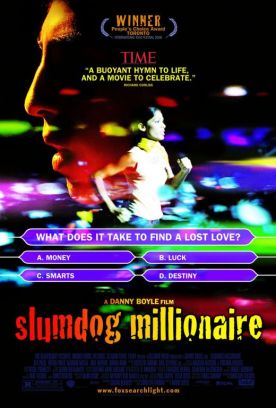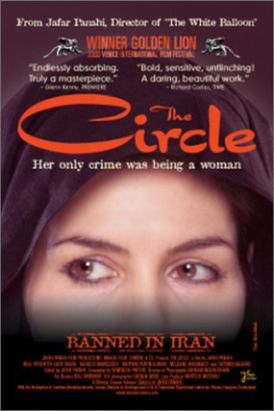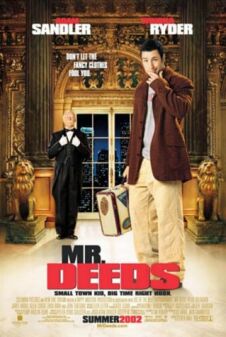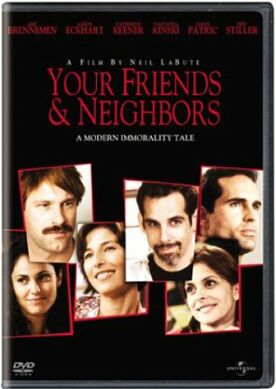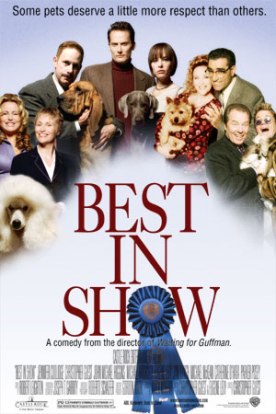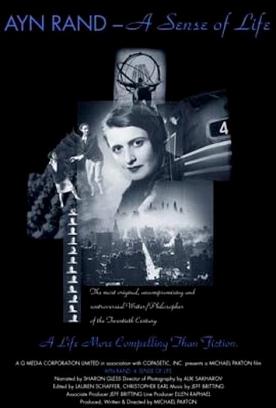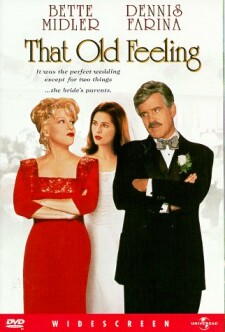Slumdog Millionaire
The critical raves for Slumdog Millionaire — directed by Danny Boyle (Trainspotting; 28 Days Later) to a screenplay that Simon Beaufoy adapted from a novel (Q & A) by Vikas Swarup — can hardly be unconnected with the fact that its hero, Jamal (Dev Patel), the “slumdog” and lowly “chai-wallah” who wins big on the Indian version of “Who Wants to be a Millionaire?” is Muslim, but secular, and is persecuted for his ancestors’ faith. His mother (Sanchita Choudhary) dies in an anti-Muslim riot by Hindus, and he himself is tortured by the police, who believe that a slumdog like him must have cheated to have done so well on the TV show. But as a story about a poor boy who makes good, the movie is pretty close to the traditional fairy tale, with the multicultural romance superimposed upon it. The latter also adds a special authenticity with a touch of what strikes me as Islamic kismet. None of this description of the picture should necessarily be construed as detracting from the pleasure to be had from it.
There is also a connection with the recent terrorist attacks in Bombay, the city in which most of the film is set and which is in some ways as much its hero as Jamal. The latter’s brother, Salim (Madhur Mittal), tells him that, with the boom times that have lately come to Bombay, “India is the center of the world, and I am at the center of the center.” Ostensibly, he is referring to his duties as factotum to a notorious and socially prominent gangster, Javed Kahn (Mahesh Manjrekar), but there is obviously more than a little of the romance and pride of Indian prosperity as Salim sweeps into his gaze the blossoming skyscrapers of Bombay. In a way, India itself has won the world’s “Who Wants to Be a Millionaire?” contest and in doing so delighted guilt-ridden Western liberals whose old ideas of India — basically, Mother Teresa, Calcutta, beggars, exotic religious practices, Taj Mahal — can now be amended appropriately.
All the same, Mr Boyle and his collaborators seem to be relying on the reality principle of the gritty, violent, impoverished, corrupt world of the Bombay streets to cut, a little, the euphoric excess of the feel-good story they are telling in order to make it look authentic — that is, depressing — enough to pass in the unforgiving world of structural movie realism. Fairy tales are fine on the big screen, provided they can be made to look something like real life. Therefore, to the extent that this contrast between the sordidness of the slums and the magnificence of Jamal’s romantic ambition to track down Latika (Freida Pinto), the love of his life — oh, and by the way, to become a millionaire along the way — doesn’t get too far out of hand, the movie ought successfully to draw us in.
The trouble is that eventually, to my eye anyway, it does get out of hand. Slumdog Millionaire turns out to be something a little bit too much like the romantic equivalent of a superhero movie. The implausibility of the central figure, who suffers setback after setback but always wins in the end, is just too great. There must always be in romantic comedy, I think, a hint of destiny. You were meant for me; I was meant for you. But it is crucial that the way the story is told should make this destined union of the two lovers look believable. There are just too many random and disappointing events in all our lives for the victory, the happy ending, the romantic fulfilment to come too easily. It is not enough, therefore, for Jamal to have suffered on the way to his destiny. We must also believe that he could fail. And that is where the movie lets us down.
Its central conceit, that all the seemingly hard and even disastrous things that have happened to Jamal in his life, turn out to have prepared him to answer just exactly the questions that the quiz show asks him, by its very nature precludes failure. The Western style destiny that comes seemingly by accident when hope is exhausted is not for the slumdog. Rather, the destiny he pursues is more of that exotic, fatalistic, Islamic variety which utterly surrenders the freedoms of natural man to the will of the Almighty. There is some attempt to build suspense in the portrayal of the TV show, with its smarmy and treacherous host (Anil Kapoor), as a framing device. But as each question on the way to the jackpot leads to a flashback from Jamal’s life, explaining how this or that episode from his dangerous and painful progress has prepared him to answer it, the sense of something a little too magical for a grown-up movie is hard to escape.
Mind you, it is now getting to the point where I almost feel that it is pointless and unfair to criticize a movie for not looking real. What movies, in the age of the superheroes and other live-action cartoons, are even trying to look real? Why criticize them for not doing what they never set out to do? If that sounds to you a cogent reason for overlooking a trivial defect — or if you are the sort of post-modernist who sees no defect at all and would be as offended by something that tried to look real as I am by something that doesn’t try to look real — you will find lots to like in a movie that follows so closely the classic Hollywood storyline of boy-gets-girl, boy-loses-girl, boy-finds-girl-again. Meanwhile the spectacular vistas of Indian life and landscape, the precarious existence of the slumdogs and the old-fashioned belief in romance make it worth seeing even for sticks-in-the-mud like me.
Discover more from James Bowman
Subscribe to get the latest posts to your email.

